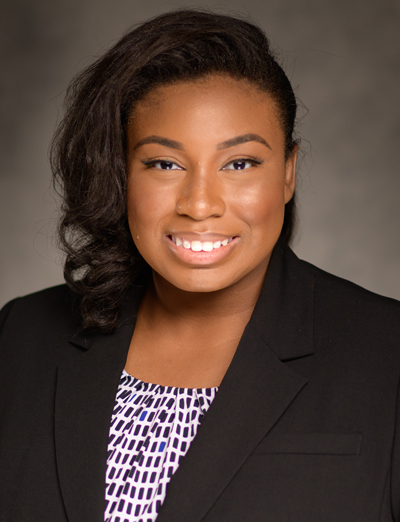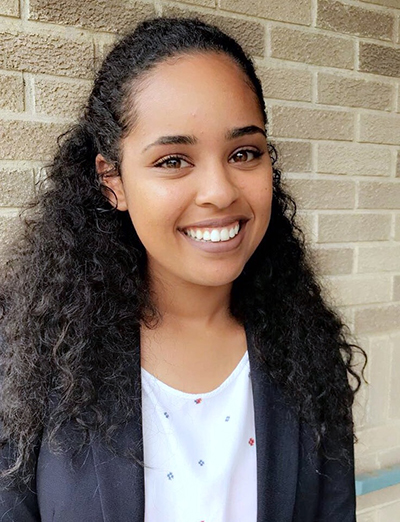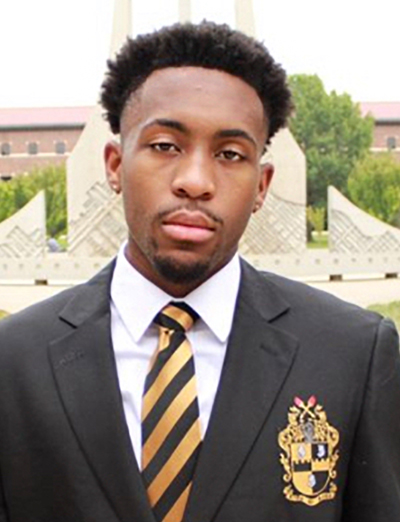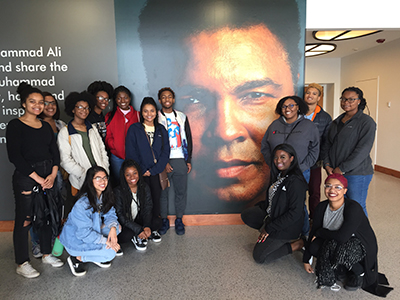Emerging Leaders
Innovative program to increase campus student diversity offers much more than financial assistance
Story by Chris Adam, Photo By John Underwood

Larrina Patterson (BS NUR ’14) came to West Lafayette from Chicago, wanting to study nursing and save lives. She’s now doing just that as a registered nurse, working in the medical intensive care unit and coronary care unit at Mount Sinai Medical Center in Chicago.
Patterson was featured in the inaugural issue of Life 360 as one of the College of Health and Human Sciences’ first recipients of the Emerging Leaders scholarship, a program designed to enhance Purdue’s diversity efforts. The program helped her, as a budding health care professional, prepare for her giant leap into the ranks of a Level 1 trauma hospital.
In the beginning
The Emerging Leaders program began in the fall of 2010 when 30 incoming Purdue freshmen from Indianapolis, Northwest Indiana and Chicago were chosen for the first Emerging Urban Leaders Scholarships, the program’s name when it was launched. Emerging Leaders has two main components: scholarship support and innovative programming opportunities.
The scholarships are renewable annually for four years. Scholarship winners are chosen from the entering freshman class based on their academic promise and leadership potential. The awards are designed to help the students complete work on their degrees in a timely manner and prepare them to be community leaders as they pursue their careers.
“This program is vital to Purdue’s ability to bring these students to campus and prepare them for great success following graduation,” says John Gates, Purdue’s vice provost for diversity and inclusion.
Although the original Emerging Leaders program focused on the entire university, Gates says its future promise involves allowing individual colleges to take the lead on developing and supporting their own scholarship recipients.
“We are working to turn Emerging Leaders into even more of a scholars program, where the students will engage with each other through academic and leadership opportunities, conferences and social events,” Gates says. “We also are working closely with the colleges to build the opportunities specific for their students. This will allow us to continue to build the community feeling among our Emerging Leaders who have varied interests for their time on campus and after they graduate.”
Heather Dykes understands the importance of the scholarship and programming aspects of Emerging Leaders for HHS students. After supervising the program from 2014-19, Dykes is now associate director of student services and director of student success for HHS.
“I love this program and the many different ways it has supported and continues to support our students in HHS,” Dykes says. “It is an incredible opportunity for us as a college to embrace students and provide them with resources and opportunities to truly create future leaders who will go on to help the world in numerous ways.”
Dykes recalls that right before she began working with the program, she and other administrators gathered in a large room to prepare for a weekend retreat with her first cohort of students. “That weekend sealed the deal for me in knowing that this was a program I wanted to be a part of and help lead for our college,” she says. “These student scholars, both in that first retreat and through the years, have inspired me with their intelligence, drive and desire to impact the world.”
And she enjoys staying in touch with current Emerging Leaders and alumni of the program, many of whom say they particularly value having this special connection with their college and a more direct line to the dean’s office.
An active participant
In 2010, Patterson had a guiding principle coming into Purdue on how she planned to function as a student – be an active participant.
“Emerging Leaders was a great program for me to make friends and build character,” Patterson says. “I was assigned a mentor, became part of a cohort of other first-year students, participated in seminars and volunteer opportunities, and took advantage of the numerous free resources available to help me achieve as much success as possible being a Purdue student.”
And Patterson kept her active use of these things focused on the real goals of academic success and professional readiness.
“The Emerging Leaders program gave me a scholarship that allowed me to attend Purdue’s prestigious nursing program, set the basis for my nursing knowledge and allowed me to be around advanced practice nurses that set the precedent to pursue further education,” she says.
She is already preparing for her next giant leap — completing a doctorate in nurse anesthesia.
Creating connections
Yohana Beraki (BS PSY ’18) says one of the most memorable aspects of being in Emerging Leaders was that Dykes allowed students to shape the program. She remembers developing networking opportunities and campus events for students to connect, including friends and family members of students in the program.

“It was part of the college’s desire to bring aspects of the program to those connections important to students,” she says.
Beraki is pursuing a doctoral program in clinical psychology to help people dealing with mental health concerns. She says the scholarship and programming components of Emerging Leaders helped set her up for success as she prepared for graduate programs in the growing mental health field.
“The most substantial way the Emerging Leaders program has helped me get to where I am is financially,” she says. “The scholarship component of the program was essential in helping me graduate from Purdue debt-free, allowing me to continue my higher education journey. Outside from financially, the Emerging Leaders program provided a supportive and studious community and many leadership opportunities, cultivating my skills for a graduate program.”
Passion for health
Nigel Taylor came to Purdue and the College of Health and Human Sciences with plans for a career that combines two of his passions: sports and medicine. Now a junior in kinesiology, the Emerging Leaders participant says the program has helped him build confidence to pursue his dreams.

“I was given a fantastic start thanks to the program,” Taylor says. “I came in with other students like myself who were serious about academics and wanting to be a leader here on campus. Those early connections really helped me hit the ground running as a Boilermaker.”
Those connections for Taylor included forming study groups and study buddies for courses that were both easy and challenging, depending on the individual student. In addition to on-campus events, Taylor has taken part in the mentoring aspect of Emerging Leaders. First as a mentee, and now as a mentor to new students in the college.
Taylor also points to networking events with alumni as a key benefit of the program, especially with his plans to attend graduate school for physical therapy.
“I learned from an alumnus about a physical therapy program that I did not know about but seems like a great fit,” he says. “I’d like to open my own comprehensive health practice, one that offers preventive health programs, rehabilitation and nutritional counseling.”
 Nigel Taylor, center, joined fellow students in HHS’ Emerging Leaders program on a field trip to Louisville and a tour of the Muhammad Ali Center in spring 2019.
Nigel Taylor, center, joined fellow students in HHS’ Emerging Leaders program on a field trip to Louisville and a tour of the Muhammad Ali Center in spring 2019.
For the future
Dykes says the college has seen the impact that alumni have on the program and students, in terms of the networking and mentoring opportunities, along with the financial support alumni have provided.
“We know there are many alumni out there who want to see the program help even more students and impact the future of public health,” she says. “We know that money makes a difference for many students as they consider their educational and professional futures.”
For those interested in learning more about opportunities to support the Emerging Leaders program, they can contact Aaron Kosdrosky in the College of Health and Human Sciences Advancement Office at ARKosdrosky@prf.org.
Emerging Leaders Events
- LinkedIn and resume development
- Networking opportunities with faculty, staff and alumni
- Campus speakers and presentations (previous speakers have included Angela Davis, Condoleezza Rice, Soledad O'Brien and Harry Belafonte)
- Social activities such as corn mazes, painting events and trivia nights
- Mental health awareness
- Academic study tables
|
|
HHS Emerging Leader | All HHS undergraduate students |
|---|---|---|
|
1-year retention rate 1 |
93.9% |
91.2% |
|
6-year graduation rate 4 |
85% |
84.1% |
NOTES:
1Weighted average of 8 new beginner cohorts, Fall 2011 thru Fall 2018
4Weighted average of 3 new beginner cohorts, Fall 2011 thru Fall 2013
Source:
Casey Marks, strategic data manager for the College of Health and Human Sciences
More Life 360 Stories
Milestones
Alumni
- Model Behavior
- On the Frontline of COVID-19
- Alumni making giant leaps in health care, aviation industries
- Tradition Transformed
- Emerging Leaders
Research
- Wearable and affordable, device targets swallowing disorders
- Evolution of a Research Relationship: From PhD Student to Peer
- Rapid Response Grant Recipients
Faculty
- Wearable and affordable, device targets swallowing disorders
- Beware the ‘quarantini’
- Safe and sustainable tourism in times of COVID-19
- Building a Community of Support
- Adapting Online … in a Hurry
- Thinking Beyond the Pandemic
- Rapid Response Grant Recipients
- Risk & Resilience: How the Pandemic Affects Those with Special Needs
Students
- Evolution of a Research Relationship: From PhD Student to Peer
- On the Frontline of COVID-19
- Tradition Transformed
- Adapting Online … in a Hurry
- Pandemic Pivot brings Gen Zs and Baby Boomers together in unique way
- HTM students learn and build community
- Emerging Leaders

